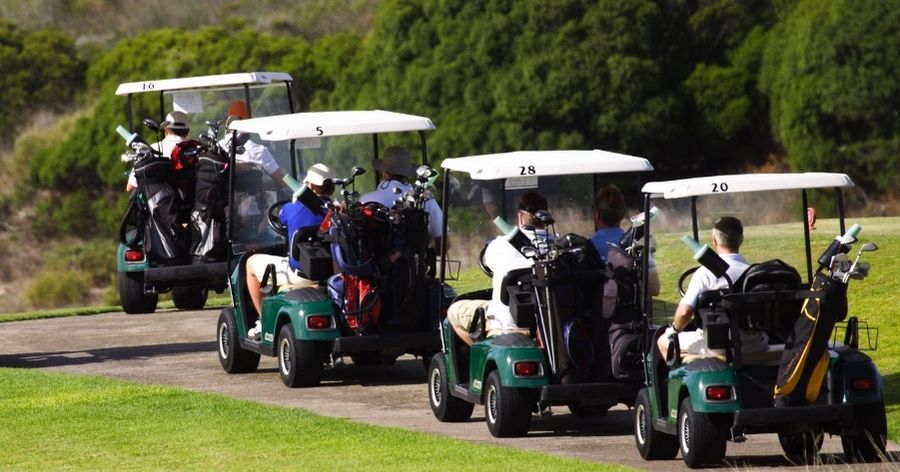
Key Takeaways
- Average Time for 18 Holes: Most players can expect to complete a round of 18 holes in approximately 4 to 5 hours, but this can vary based on several factors.
- Influence of Skill Level: Beginners generally take longer to complete their rounds due to more strokes and ball retrieval, while experienced players can finish faster with fewer delays.
- Course Conditions Matter: The layout of the course—such as the difficulty, terrain, and weather conditions—significantly impacts playing time. Open courses allow for quicker play than challenging, wooded ones.
- Group Size and Pace: The number of players in your group can affect the duration of your game. Larger groups tend to take longer, especially if inexperienced players are involved.
- Tips for Efficiency: Preparing for your turn, limiting search time for lost balls, and playing ready golf can enhance the pace of play and overall enjoyment on the course.
- Proper Tees: Choosing the right set of tees based on your skill level can help minimize strokes and improve your experience, making rounds more enjoyable and quicker.
You’ve probably found yourself on the course, wondering “how long does it take to golf 18 holes“.
I remember days when I’d finish in about four hours, feeling pretty good about my game.
Then there were those frustrating rounds that stretched close to five hours, even when I was hitting the ball well.
It left me questioning my pace and whether I was doing something wrong.
Understanding the average time it takes to play a round of golf can help you gauge your performance and enhance your enjoyment of the game.
In this post, we’ll explore average golf scores for beginners, factors affecting your pace, and tips to improve your efficiency on the course.
By the end, you’ll have a clearer picture of what to expect and how to make the most of your time while golfing.
How Long Does It Take to Play 18 Holes of Golf?
Timing for a round of golf can vary, but most players should expect it to take around four to five hours.
Based on a study done by the United States Golf Association, this is fairly accurate to what I’m witnessing as well.
Let’s jump into the factors that shape this timeline and see what you can anticipate based on your situation.
1. Golfer Skill Level
Beginners, you’re looking at longer rounds, typically because of more strokes and the majority of your time on the golf course will be searching for your ball.
Ever spent a few minutes hunting for a wayward shot in the trees?
Average golfers or skilled players, on the other hand, take less time than their beginner counterparts.
Consistent drives down the fairway reduce search time, keeping the round moving.
2. Course Difficulty
Course layout and design significantly affect how long a round will take.
Open fairways allow for easier navigation and reduces the time looking for your golf ball.
In contrast, courses with dense tree lines or numerous hazards can slow you down considerably. You might spend extra time searching for errant shots or exploring tricky lies.
Longer courses naturally take more time to play. Each additional yard adds up over 18 holes.
Golf courses with varying elevations also present challenges. When you can’t see where your ball lands, you might need extra time to locate it and complete the hole.
A challenging course doesn’t just test your skills—it tests your patience, too.
3. Course Conditions

Weather and course maintenance affect play speed.
Ideal conditions—sunny skies and well-maintained fairways—often draw more players, potentially slowing down the overall pace. But, these conditions usually allow for smoother play.
Windy, cold, or rainy weather can reduce crowds but may increase the time to complete each hole. Adverse conditions challenge high and mid-handicap golfers, leading to more shots and longer time on the course.
Wet fairways and greens also slow ball roll, potentially adding strokes to complete a hole.
Fun fact: Some pros actually prefer playing in the wind—it adds an extra layer of strategy to their game.
4. Number of Players In Your Group
The number of players in your group directly affects the time it takes to complete 18 holes.
Larger groups naturally take longer as each player needs time to set up and take their shots.
A foursome typically takes about 4-5 hours to complete 18 holes, while a twosome might finish in 3 hours.
Playing solo? You could potentially zoom through 18 holes in 2-2.5 hours if the course isn’t crowded. But remember, golf’s a social game. Sometimes, the extra time with friends is worth it.
5. Pace of Play
Your group’s pace isn’t the only factor—other players on the course matter too.
Even if you’re playing quickly, slow groups ahead can significantly delay your round.
On busy days, you might find your waiting time to increase, adding up to an hour or more to your total time.
Pro tip: If you’re stuck behind slow players, don’t get frustrated. Use the extra time to plan your next shot or practice your putting stroke.
6. Tee Time
When you tee off can greatly affect your round duration.
Early morning tee times are often more crowded, especially on weekends. You might face longer wait times between holes during these peak hours.
Late afternoon or twilight rounds can offer a faster pace, but be mindful of daylight.
Some courses offer twilight discounts, which can attract more players and potentially slow things down again.
7. Riding In A Cart vs. Walking

Your choice of transportation on the course impacts playtime.
Riding in golf carts can significantly speed up your round, especially on courses with long distances between holes.
With a cart, you can typically complete 18 holes 30-45 minutes faster than walking.
Walking, while slower, offers its own benefits. It’s great exercise and allows you to fully appreciate the course. Plus, some argue it helps them stay focused and play better.
Ever noticed how your best shots often come right after you’ve walked up to your ball?
Bottom line: Whether you choose to ride or walk, be mindful of your pace. Keep up with the group ahead.
Average Time to Play 18 Holes of Golf

The average time to play 18 holes of golf varies depending on several factors, including the number of players and course conditions.
Let’s break down the typical scenarios you might encounter on the links.
Scenario #1: Solo or Playing Alone
The average round of golf for solo artists is usually around 2.5 to 3.5 hours.
No waiting around; just you, the course, and the freedom to play faster. You might find that you can breeze through holes, especially if you keep a steady rhythm.
But here’s the catch – most courses won’t let you play alone during peak times.
So, realistically, you’re looking at 3 to 3.5 hours for a solo round – which is still a quick time.
Scenario #2: Twosome
Anytime you include a person in your group, also impacts how long it takes to complete a full round of golf.
In a twosome, a round of golf will take roughly 3 to 4 hours and 30 minutes.
Even though the camaraderie adds a nice touch, it can slow you down a bit.
You’ll find yourself chatting and sharing tips between swings.
Just remember, even with fewer players, the pace still matters. Make sure to keep the flow going, and avoid lingering on every shot.
Scenario #3: Foursome
Ah, the classic foursome.
When you play with four players, it could take closer to 4-5 hours to finish a round of golf.
Four people, four sets of clubs, and each waiting to take their shot can lead to a bit of a wait.
That’s the reality, but you can make the most of it.
Use that downtime to analyze your shots or strategize your next move.
Playing golf is as much about socializing as it is about the scorecard. And hey, if you plan it right, you can keep things moving and maybe even squeeze it down to that 4-hour mark.
Scenario #4: Crowded Golf Course
A crowded golf course?
This will definitely impact the time it takes to complete a round of golf.
The added players on the course, mixed with varying skills, can easily make this round 5 hours.
Course management schedules tee times closely together, causing bottlenecks on greens and tee boxes.
But don’t let it ruin your game—use the waits to soak in the sights or catch up with your buddies.
Just remember, it’s all part of the experience. Embrace the moment; after all, it’s not just about the score, but the journey on the links.
Tips To Play Faster

Efficient play enhances not only your golfing experience but the experience of other players in the group.
Use these tips to speed up your round without sacrificing enjoyment.
Tip #1: Be Ready to Play
Be prepared before it’s your turn.
Keep your golf clubs organized and your ball in hand.
Know the course layout and understand your club selections.
Do you need that 7-iron, or is it time for your driver?
When it’s your shot, step up, take a practice swing, and go for it. No dawdling.
Watching your pace not only keeps the game moving but adds to your mental focus.
Get in the zone, and let’s keep the rhythm on the course!
Tip #2: Keep an Eye on the Players Ahead
Keep an eye on the group in front of you.
If they’re taking time on the green, you can take your time prepping for your approach shot.
Notice their pace.
If they’re moving slowly, it’s your cue to stay alert and ready.
Don’t slow down your play; you won’t gain any advantage by waiting around.
When you see them preparing to putt, start lining up your shot. Keep the flow going—it makes for a smoother round!
Tip #3: Limit Your Search Time
Lost balls can feel like a destiny wracked with frustration.
If you lose one, limit your search to about three minutes. That’s the standard, and it keeps everyone’s spirits up.
If you don’t find it in that time, drop another ball and keep playing.
You can always find your lost ball later—remember, you want to finish strong, not let a rogue ball ruin your rhythm!
Pro tip: watch your ball’s flight path carefully and use landmarks to remember where it landed.
And if you’re playing a course known for eating balls, consider using cheaper ones. No sense losing a $5 ball in that water hazard.
Tip #4: Play Ready Golf
Play ready golf whenever possible.
It’s all about taking your shot when you’re set.
If you’re farther from the hole and ready to go, hit first.
You don’t have to wait for the player farthest from the hole to take their swing.
Just keep safety in mind.
It encourages a faster pace and adds an element of teamwork. Let’s admit it, golf’s more fun when everyone’s on the same page!
Tip #5: Playing The Right Tees
Playing from the proper tees matters more than you think.
Imagine a high handicapper trying to tackle championship tees—yikes!
Ego can push you back a set, but it can lead to frustration.
Play from a set of tees that matches your skill level.
Choose the ones that fit your game to avoid excessive strokes and time wasted.
You’ll enjoy yourself more, and who knows, you might even score that coveted birdie!
FAQ
Golf etiquette and timing can be tricky to navigate.
Here are some common questions about golf timing and their answers to help you better understand the game’s pace.
How Much Time Do Golf Courses Leave Between Tee Times?
Golf courses typically have their tee time intervals between 8 to 15 minutes.
Why’s that?
It helps maintain a steady flow on the course and keeps players from bunching up.
When you think about it, a tight schedule can lead to frustrating delays and slow play.
Some busy courses may lean towards shorter intervals to maximize rounds during peak hours, while others allow a bit more space during less crowded times.
If you’re heading out on a weekend morning, expect to see those intervals tighten up—everyone wants to get their round in.
How Long Does It Take Professionals to Play 18 Holes of Golf?
On average, a professional foursome zips through 18 holes in about 4 hours. That’s including all the tournament hoopla – crowds, TV cameras, the works.
But here’s the kicker: in non-tournament play, these pros can blaze through a round in 3 hours or less.
Don’t compare yourself to these speed demons. Pros have a few tricks up their sleeves:
- They rarely lose balls (must be nice, right?)
- Caddies do the legwork, saving time.
- They’re decisive – no hemming and hawing over club selection.
- Years of experience mean they know their distances.
But even the pros slow down sometimes. In major tournaments, rounds can stretch to 4.5 or even 5 hours. More at stake, more pressure, more time.
How long does it take to play 18 holes of golf in a tournament?
Tournament golf? That’s a whole different ballgame, folks.
For your average amateur tournament, you’re looking at anywhere from 4.5 to 6 hours for 18 holes.
Yep, you read that right – 6 hours! Why so long? Well, there’s a laundry list of reasons.
First off, the stakes are higher. Players take more time to line up shots, read greens, and generally fret over every little detail.
Then there’s the waiting game. With full fields, you might find yourself cooling your heels on every tee box.
Tournaments also have additional rules that slow things down. Gotta play every shot out – no friendly gimmies here. And if there’s a rules dispute? Everything grinds to a halt while officials sort it out.
If you’re talking pro tournaments, that’s another beast. They’ve got larger galleries to manage, TV schedules to consider, and don’t even get me started on playoff situations. A final round on Sunday could easily stretch beyond 5 hours if things get tight at the top.
Before you Go
It sounds like you’re just starting your golf journey since you’re wondering how long it takes to finish a full round.
If that’s the case, please check out my other posts that’s focused for beginners wanting to improve their game:
- Average Golf Score For Beginners – How Do You Stack Up?
- Top 18 Reasons – Are Golf Lessons Worth It for Beginners?
- How To Break 100 In Golf – 15 Ways to Achieve Your Dream Score
Cheers!
